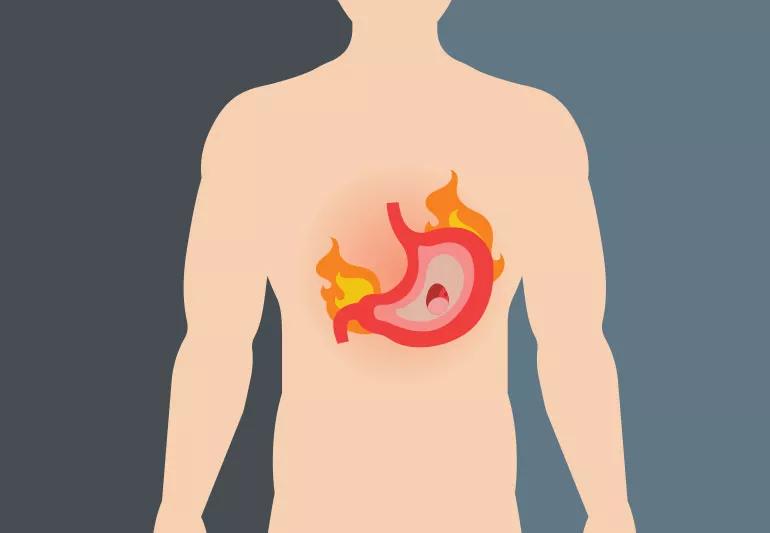Understanding causes + how to find relief

Do you ever find yourself doubled over in pain? Sometimes it’s mild — and other times, it’s an all-consuming, will-this-ever-end, curled-up-on-the-floor kind of pain.
Advertisement
Cleveland Clinic is a non-profit academic medical center. Advertising on our site helps support our mission. We do not endorse non-Cleveland Clinic products or services. Policy
Gastritis can be a total downer — not just because of the stomach pains, but also because of how it crimps your lifestyle, causing you to live with the constant fear of when it might happen next.
It’s time to get to the bottom of what’s causing this pain.
Gastritis is the term used to describe inflammation or irritation of the stomach lining. According to gastroenterologist Christine Lee, MD, the irritation can be the result of wide variety of causes such as infections, medications like aspirin or NSAIDs, stomach (gastric) cancer, or toxic substances including excessive alcohol, ingesting poison or chemicals, or excess stomach acid buildup.
“Take a skinned knee: The surface lining is damaged and the body increases blood flow to the area to help the healing process,” says Dr. Lee. “Then, neutrophils and lymphocytes (types of white blood cells) come in to help fight off bacteria and start the repair process. The result is that the area gets inflamed (swollen or appearing bruised before healing). This inflammatory process can bear down on nerve endings and cause different levels of pain.”
That same process occurs in the stomach lining and — just like a skinned knee — it can “ache” or “hurt” in varying intensities.
Advertisement
Doctors can’t explain why the pain is excruciatingly intense for some people and mildly nagging for others. The short answer is that people perceive pain at different intensities.
Dr. Lee says gastritis pain usually occurs in the mid-upper stomach region, just below the breastbone and above the belly button. People describe gastritis pain in different ways, but these descriptions are common:
The pain quality varies widely. It can come and go in some. In others, it may be constant with waxing and waning intensities — with or without specific triggers (like it may be worse before or after eating). Sometimes, the pain will come and hang around. Other times, it comes and goes with periods of little-to-no discomfort.
Dr. Lee also says most people intuitively know when the symptoms warrant a trip to the ER. She recommends calling 911 or going to the emergency room if you experience alarming signs such as:
If you’ve had periods of awful stomach pain, make an appointment with your primary physician or a gastroenterologist — a digestive specialist.
Gastroenterologists will try to get to the bottom of why you are in so much pain and rule out other concerns like peptic ulcer disease, gallstones, pancreatitis, celiac disease or abnormal cell growth. They’ll ask you when, where, and how severe the pain is on a scale of 1 to 10, and anything that makes your symptoms better or worse.
Common causes for gastritis include:
Sometimes, conservative measures — like avoiding triggers or staying upright for two to three hours after eating — can make a huge difference. You may need extra testing to figure out what will bring relief. Common gastritis treatments include medications or working with a dietitian to figure out the right eating plan for you.
Dr. Lee says only a small percentage progress into serious complications from chronic gastritis. These include different types of gastric cancers, peptic ulcer diseases that cause intestinal perforation, which can then lead to sepsis and possibly death.
In the majority of gastritis cases, with the right combination of treatments and lifestyle modifications, resolve themselves without any severe consequences.
“My best advice is to pay attention to your body. If you’ve been living with on-again, off-again pain for more than couple of weeks, or you’re experiencing unexplained weight loss, bleeding, or any new symptoms that fail to improve or resolve completely, it’s probably time to see a doctor,” says Dr. Lee.
Advertisement
Talk to your doctor about your symptoms so you get the right type of evaluation. This will make sure you receive an accurate diagnosis and treatment.
Advertisement
Learn more about our editorial process.
Advertisement

Nausea, fullness, heartburn and unexplained weight loss may signal that something is going on with your GI system

Peppermint oil, exercise and a belly massage can help, but for ongoing symptoms, you may need to talk to a healthcare provider

Prioritizing nutrition and physical activity are key to staying strong and energized

Your relationships with food, physical fitness, social interactions and advance planning desires may need to be modified

Opt for soft foods or liquids that are rich in protein, calories and vitamins

Stomach cancer tends to spread to the lymphatic system and liver before moving to other areas

Delivered through an IV, options can include chemotherapy, immunotherapy or targeted therapy, or a combination

A small percentage of gastric cancer is genetic

Start having sex about 72 hours before ovulation, then at least every other day during your fertile window

Attachment theory suggests that your earliest relationships shape connections throughout your life

It isn’t a recognized mental health disorder, but research shows that problematic social media use can negatively affect your mental health, self-esteem and sleep